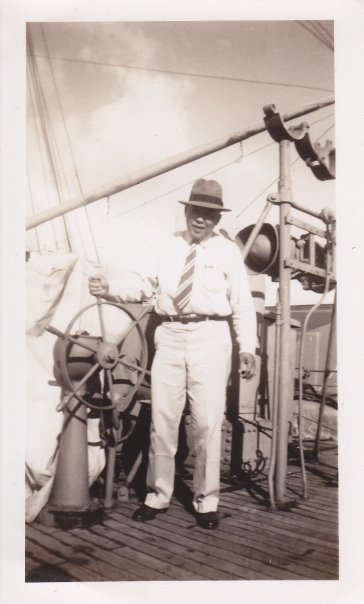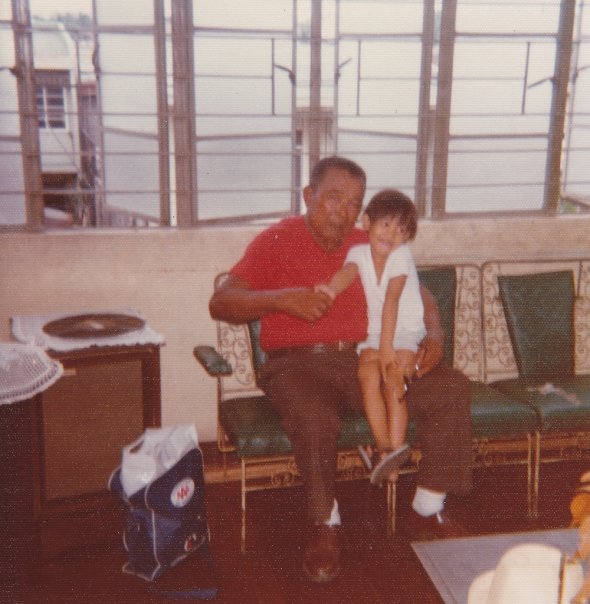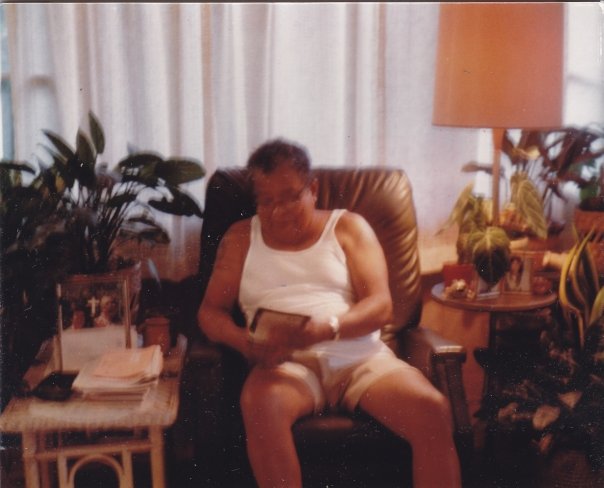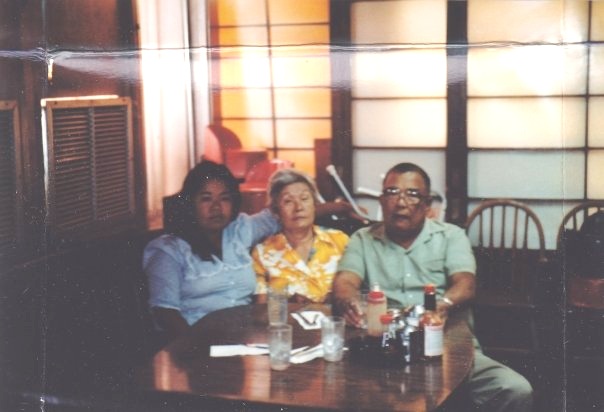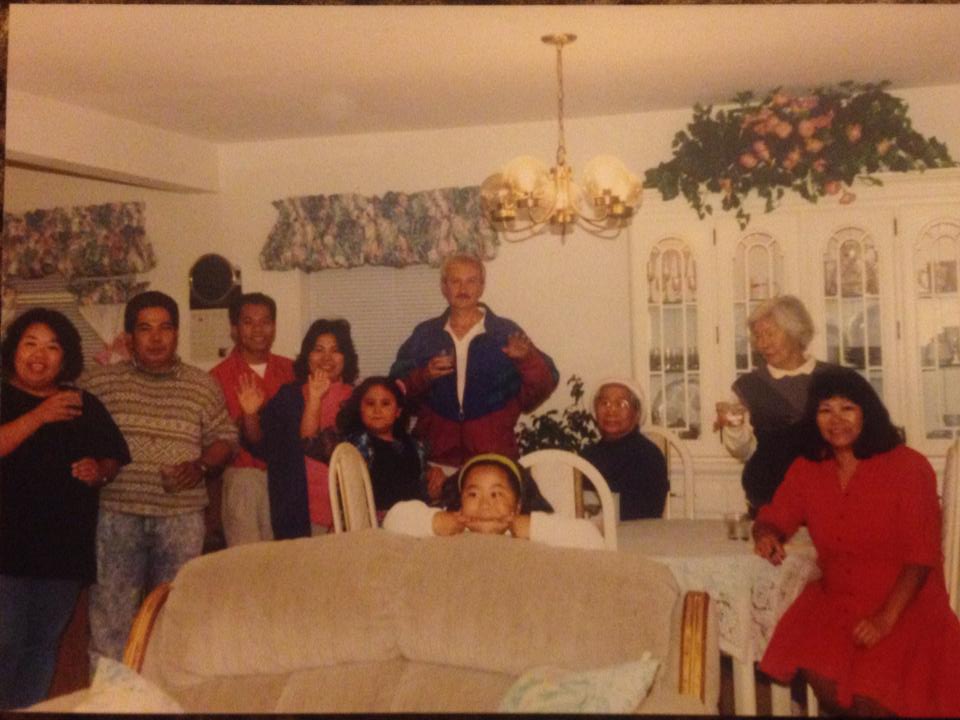Kumarehood
I had goosebumps as we were getting ready to walk side by side. The parade procession at the 2019 Filipino Fiesta in South Sacramento spanned two blocks and of course, was running on Filipino time. Dressed in my borrowed duster with my son next to me in his stroller, I stood in the parking lot reflecting on how little I knew about my Filipino heritage. Growing up in a predominately conservative, Caucasian city left me with limited chances to embrace my culture. For nearly 20 years I was ashamed to be Filipino. It hurts to type this but I thought that to be Filipino was to be dirty. To this day, I still don’t know the language and barely know how to cook the foods. I am ignorant. I grew up to be exactly what my grandparents hoped we would become: fully acclimated into American culture.
Patiently waiting for the parade to start, we managed to snap a photo with the Jolly Bee!
(Photo credit: Kumare Culture)
When I graduated from high school, I found myself desperately trying to return to the California Bay Area for college. In the early 2000’s there were still more Asian markets and communities out there than in Sacramento (or so I thought). I was of the mindset that relocating elsewhere would provide me with an opportunity to get closer to those who could show me the way to my ugat. However, life and family kept me in Sacramento during my college years. In college, in lieu of the Bay Area, I attempted to immerse myself with the Samahang Pilipino organization at Sacramento State. Still feeling like an outsider, like I wasn’t Filipina enough, I made a quick exit and didn’t ask any further questions about my culture until a conversation about wrapping paper with Christine Liwag Dixon on Twitter during the Christmas of 2017. Through my online association with the incredibly talented, thought provoking writer, I came to learn of a Sacramento based company called Kumare Culture.
Excited to get the parade started!
Kumare is the Tagalog word for close female friend. Kumarehood Co-operative is a group started by Leana, the founder of Kumare Culture. Leana’s vision is to empower Pinay youth, ages 5-18 by teaching them self-love and build their fellow kumares up, while learning Filipino culture. I joined the Kumarehood with hopes of finding a tita to call my own. What I found were other Filipina women like me, some who broke the molds of “tradition”, that I could relate to. Today I stand with fellow titas, ready to mentor young Pinays and prepare them for the future through conversations that our elders didn’t necessarily know how to have.
Prior to getting involved with this new Filipina community, my perception of “being Filipino” was that of coming from a broken home. I think of the families who have been separated, leaving the Philippines in order to earn a decent wage in foreign countries to send money back home. I think of the mothers, fathers, and siblings who flee for the sake of a better life and often times don’t return to their motherland. I think of the hurt and resentment these actions have taken on family structures. This happened with my grandfather, Fermin Urmeneta during the 1920’s when he left the Philippines for Hawaii and again with my step-father, Simplicio Mariano, in the 1970’s when he worked on a ship sailing around the world, eventually arriving to the United States. My grandfather found work in Hawaii as a ship welder at Pearl Harbor and built a home in Haleiwa with my grandmother where they had nine children. It is my understanding that he would go back to the Philippines a few times to visit before he passed away in 1983. As for my step-father, he hasn’t been back to the Philippines in over 30 years. Of his eight siblings, three of his sisters reside in Northern California. His brothers remain in Mindanao. It is because of this brokenness that my step-father’s family holds on tight to their loved ones and welcome those who have origins in the Philippines. Despite the circumstances that caused them to relocate, my step-father’s family generally have joyful spirits and always find a reason to get together and celebrate. Gatherings are filled with home cooked meals, card games, music, dancing and laughter. It is because of their resilience, determination and adaptability that they choose to celebrate the now as opposed to their past.
(Photo credit: Kumare Culture)
Attending the Filipino Fiesta and standing side-by-side with my kumare made me see how proud our people are of where they came from and why they embrace their community. Donning our brightly colored butterfly sleeves, my kumare walked together in the parade, greeting smiling faces young and old. The little ones passed out flowers of encouragement to generate conversation. Afterwards I purchased some lunch at the Masarap food truck, sat next to the Kumare Culture booth and shared my pork sigsig, pancit and rice with my son. I felt like I was at a family gathering. The smell of the vinegar, meat-based entree and the kindness of Leana’s family was all too familiar. The more I come to understand, the less ashamed I feel. We are a beautiful, misunderstood, and underestimated people capable of more than we realize. Starting with my own family, I want to heal the brokenness we’ve experienced over the generations so we can continue to rise and embrace what is ours. Colonized by Spain, the United States of America and Japan; who were we before others told us who to be? My curiosity and hunger to learn more about my family’s ancestry has been reignited.





